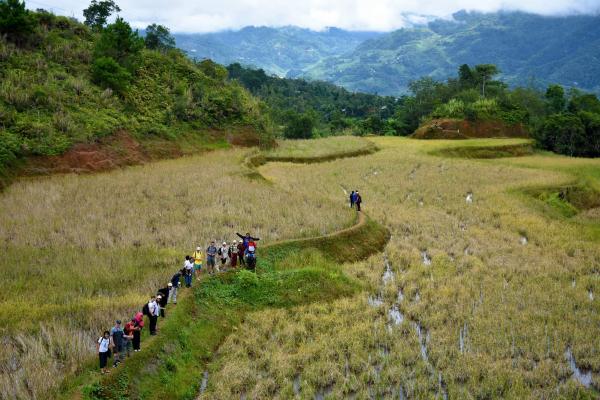IRRI: A Magical Place for Research

I was fortunate enough to start my PhD program by traveling to a country to gain insight on all facets of rice research and production and gain international agricultural research experience. I am grateful for the opportunity to participate in the International Rice Research Institute (IRRI) short term training on Rice: Research to Production. The course allowed me to have a better understanding of the current agricultural problems faced by the rice farmers, including high production costs and low income. The impactful experience was made possible thanks to TPS and Dr. Guo-Liang Wang.
Rice is the daily staple for over 3.5 billion people, including the majority of the world’s poor. IRRI is a premier non-profit research and educational institute dedicated to reducing poverty, hunger, and malnutrition. Through rice science, IRRI aims to improve the health and welfare of people whose diet largely depends on rice. IRRI was founded in the Philippines and now have offices in 17 rice-growing countries throughout Asia and Africa, allowing them to extend their impact. IRRI is also home to the International Rice Genebank, the biggest collection of rice genetic diversity in the world. We were able to tour the facility, which safeguards the valuable samples, and were briefed on how they operate and organize all their material.
The course covered a wide range of topics in rice farming including the fundamentals of rice production, aspects of the market, advancements and current directions of rice breeding programs, and changes and challenges in the rice industry. The training consisted of lectures, group discussions, and hand-on activities in lab and field settings. In total, we were 19 participants from 10 countries and more than 30 IRRI scientists which provided a great opportunity to network with other attendees and IRRI scientists. Moreover, the training included lectures and group building activities for structuring effective collaborations within the international research community. One particular activity involved identifying a rice related problem in a rice-growing developing country and provide potential solutions in a research proposal video. I was grouped with Indonesia and was tasked with using my knowledge to try to come up with a way to address water availability.
While we were exposed to the new technologies being introduced to the rice industry, it was humbling to go out into the rice paddy barefoot and try to guide a Carabao as we prepared the field for planting, which we did by hand. Coming from California where everything seems to be mechanized it was interesting to see these practices still being used. I realized that the cool new technologies being adopted by farmers in the US would not be applicable in a poor rural farm. We had the opportunity to interview local farmers near the IRRI campus and gain insight on how and why they form farmer cooperatives and try to deal with challenges. We also visited the rice terraces in Banaue where they grow heirloom varieties. There, all the farmers we spoke to spoke in dialect and were older woman who explained that the youth leave for the city and they are tasked with farming on the steep terraces. And there I was thinking, “If only we could use tractors here”.
By communicating with the fellow participants, IRRI faculty and local farmers I was able to truly gain a deeper understanding and appreciation of the challenges in the rice industry. My biggest take away was to always remember to look at the bigger picture. As our research becomes increasingly specific, I think it’s important to take a step back and look at the bigger picture. Attending the course allowed me to gain a new perspective and I know find myself asking, How can my research be applied on a wider level? How can it be impactful?
Written by TPS Fellow Josue Diaz
